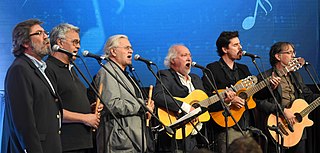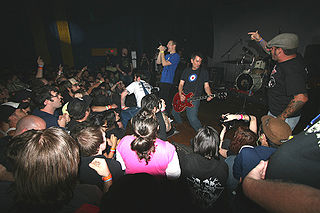Related Research Articles
Violeta del Carmen Parra Sandoval was a Chilean composer, singer-songwriter, folklorist, ethnomusicologist and visual artist. She pioneered the Nueva Canción Chilena, a renewal and a reinvention of Chilean folk music that would extend its sphere of influence outside Chile.
The tres is a three-course chordophone of Cuban origin. The most widespread variety of the instrument is the original Cuban tres with six strings. Its sound has become a defining characteristic of the Cuban son and it is commonly played in a variety of Afro-Cuban genres. In the 1930s, the instrument was adapted into the Puerto Rican tres, which has nine strings and a body similar to that of the cuatro.

Quilapayún are a folk music group from Chile and among the longest lasting and most influential ambassadors of the Nueva Canción Chilena movement and genre. Formed during the mid-1960s, the group became inseparable with the revolution that occurred in the popular music of the country under the Popular Unity Government of Salvador Allende.

Naked Raygun is an American punk rock band that formed in Chicago in 1980. The band was active from 1980 to 1992, along with reunion shows in 1997, and since 2006.
The Scorpions are a 1960s British beat group, originally from Manchester in England, that became popular notably in the Netherlands. Their most important hit was "Hello Josephine", a song by Fats Domino.

The Shadows were an English instrumental rock group, who dominated the British popular music charts in the pre-Beatles era from the late 1950s to the early 1960s. They served as the backing band for Cliff Richard from 1958 to 1968, and have joined him for several reunion tours.

Bruce Cripps, known professionally as Bruce Welch, is an English guitarist, songwriter, producer, singer and businessman best known as a founding member of the Shadows.

Barón Rojo is a Spanish heavy metal band from Madrid that achieved international success in the 1980s. The band is led by siblings Carlos and Armando de Castro, previously from the band Coz, and is considered one of the most important representatives of Spanish hard rock. Barón Rojo in Spanish means "red baron", the name of the band being an homage to Manfred von Richthofen; the 1981 eponymous song "Barón Rojo" is about him. In 2017, they were ranked number 18 on Rolling Stone's "50 Greatest Spanish Rock Bands".
Dead Man's Curve is a London surf music band, named after the hit song by Jan and Dean. Started in 1995 they played classic London venues such as the Borderline and the 100 Club. They received regular radio plays on BBC Radio 1 and XFM, and have played with many of the surf bands including Jon & The Nightriders and The Surfin' Lungs.
Santiago de Murcia was a Spanish guitarist and composer.
"Manhã de Carnaval", often referred to as "Black Orpheus", is a song by Brazilian composer Luiz Bonfá and lyricist Antônio Maria.

El Cuarteto de Nos is an Uruguayan rock band formed in 1984 in Montevideo. Over the years, due to its particular sound that mixes elements of hip hop, alternative rock, comedy rock and Latin music, the group has developed an immense amount of popularity and praise in Latin America and Hispanic countries. The band won two Latin Grammy Awards in 2012 for Best Pop/Rock Album and Best Rock Song.
Andria Busic is a Brazilian bassist/vocalist who has worked with such bands as Dr. Sin, Ultraje a Rigor, Taffo, Supla and Eduardo Araújo.

Warren Bennett is an English musician, composer and performer. He was educated at Mill Hill School and is the son of Brian Bennett, the Shadows' drummer. He played keyboards on tour with the Shadows on their farewell tours from 2004 till 2015, with and without one-time front man Cliff Richard. Warren's professional musical career began in 1977 when, aged 15, his first composition for television was used for ITV's Summer Promotional Campaign. Also that year he co-wrote "The Girls Back Home", which was released as a single from the Rock Dreams album by the Brian Bennett Band. This initial success, especially in television, led to him becoming not only an accomplished musician, writer and producer but also as an established composer for feature films.

Expletive Delighted! is a 1986 album by British folk rock band Fairport Convention, their fifteenth studio album since their debut in 1968. It is the band's only album consisting solely of instrumental tracks, despite the claim "Lyric sheet enclosed" on the album cover.
Mike Porcel is an exiled Cuban born-American musician, guitarist, composer, orchestrator and songwriter better associated with the Cuban musical movement of the 60s & 70s Nueva trova. He has been called one of the most influential and creative contemporary Cuban musician of his generation. His compositions carry a heavy dose of poetry mixed with complex guitar melodies influenced by a tremendous array of musical styles, from classical music to rock, jazz, ethnic rhythms and new age. He was also the co-founder and musical director of the Cuban progressive-rock band "Síntesis".

Congreso is a musical band from Chile. Founded in 1969 in Quilpué, the band has been highly acclaimed with over 50 years in Latin American music.
The Jet Black's was an instrumental rock band from São Paulo, Brazil. The band was formed in 1961 by Jurandi (drums), Orestes, Ernestico (saxophone), and José Paulo (bass), and Cat/Gato joined the following year. Their first single was "Apache"/"Kon-Tiki", followed by "Hully-Gully" (1962), and "Twist/The Jet Black's Again" (1963).
Alejandro González González is a Cuban musician, guitarist and professor with notable work in the Dominican Republic.

The Pipeline Instrumental Review, also known as Pipeline Magazine, is a British periodical magazine that focuses on instrumental rock music which was most popular in the 1950s and 1960s with bands and performers such as The Shadows, Duane Eddy, The Ventures, and The Spotnicks among many others. The title of the magazine comes from the 1963 surf rock instrumental hit, "Pipeline" by The Chantays.
References
- 1 2 3 "Los 4 Jets". Lafonoteca (in Spanish). Archived from the original on September 29, 2024. Retrieved September 24, 2024.
- 1 2 3 4 5 6 7 8 9 10 11 12 Taylor, Alan, ed. (2002). "The Story of... Los 4 Jets". Pipeline Instrumental Review (54): 9–16. ISSN 1470-8353.
- 1 2 3 4 5 "Los Jets". cliff-shadowsmeeting.eu. Archived from the original on June 12, 2024. Retrieved September 24, 2024.
- 1 2 "Pipeline Convention 2002". pipelinemag.co.uk. Archived from the original on May 26, 2024. Retrieved September 24, 2024.
- ↑ "Pipeline Convention 2005". pipelinemag.co.uk. Archived from the original on April 21, 2024. Retrieved September 25, 2024.
- ↑ "Pipeline Convention 2008". pipelinemag.co.uk. Archived from the original on April 21, 2024. Retrieved September 25, 2024.